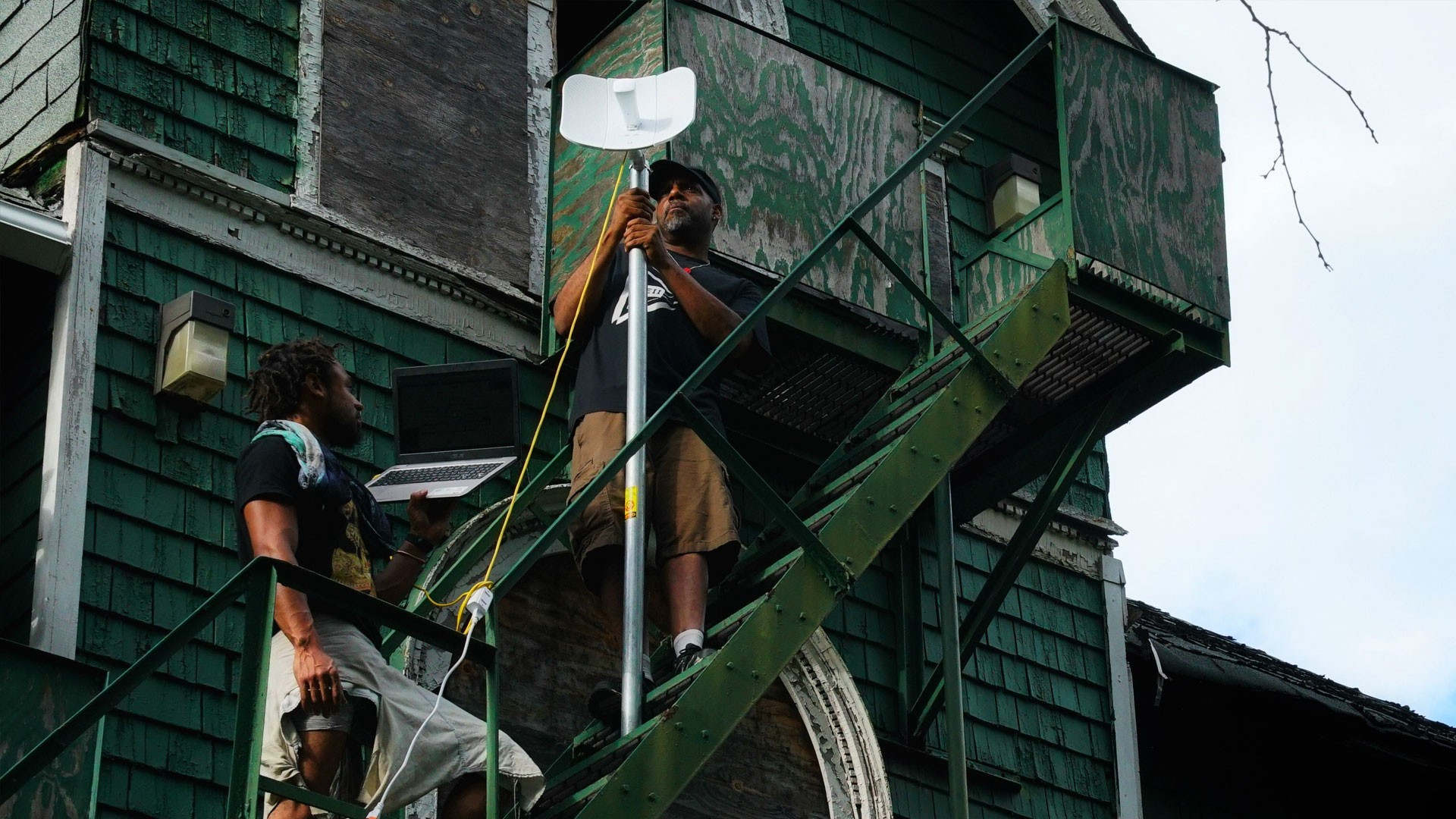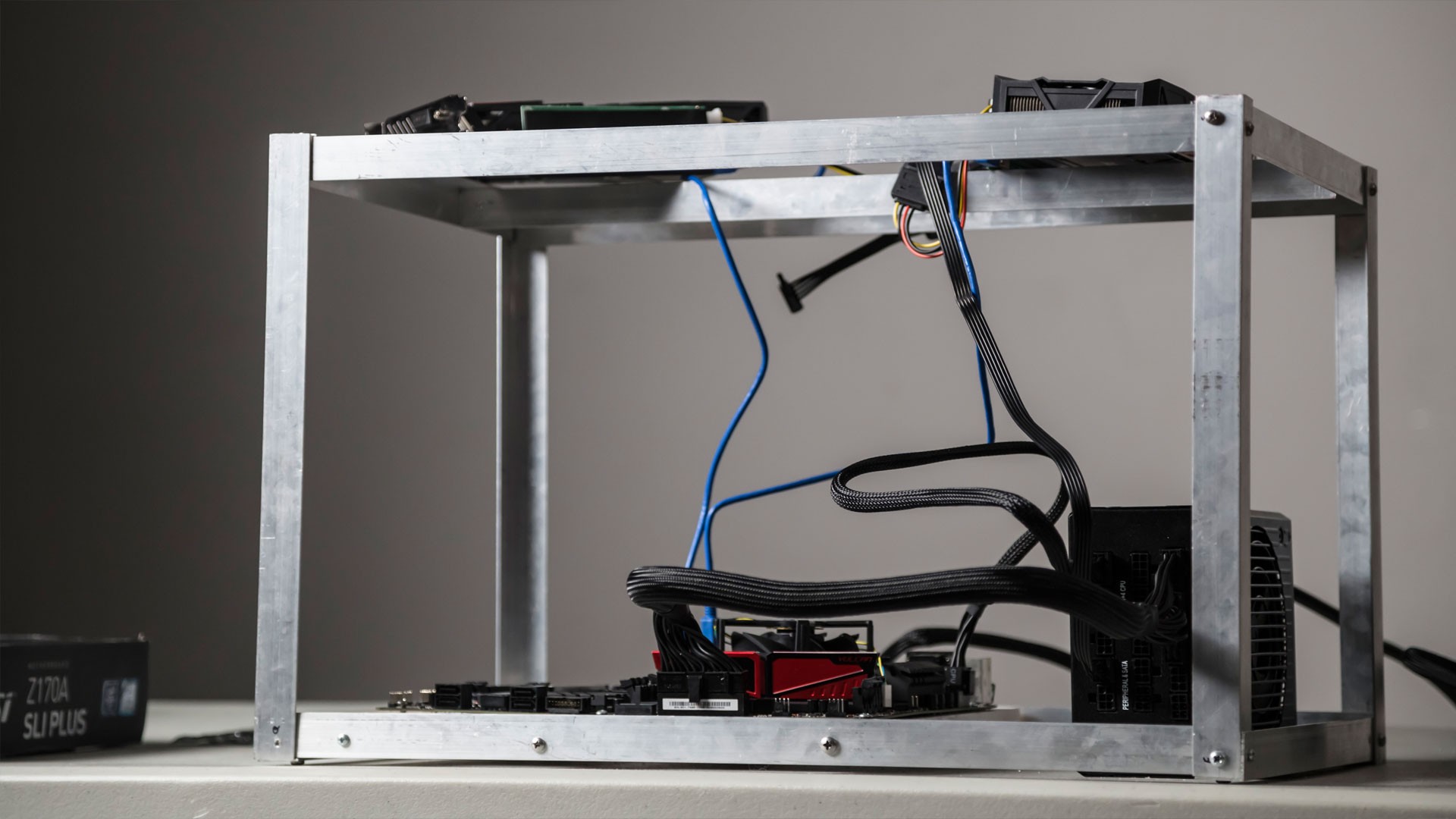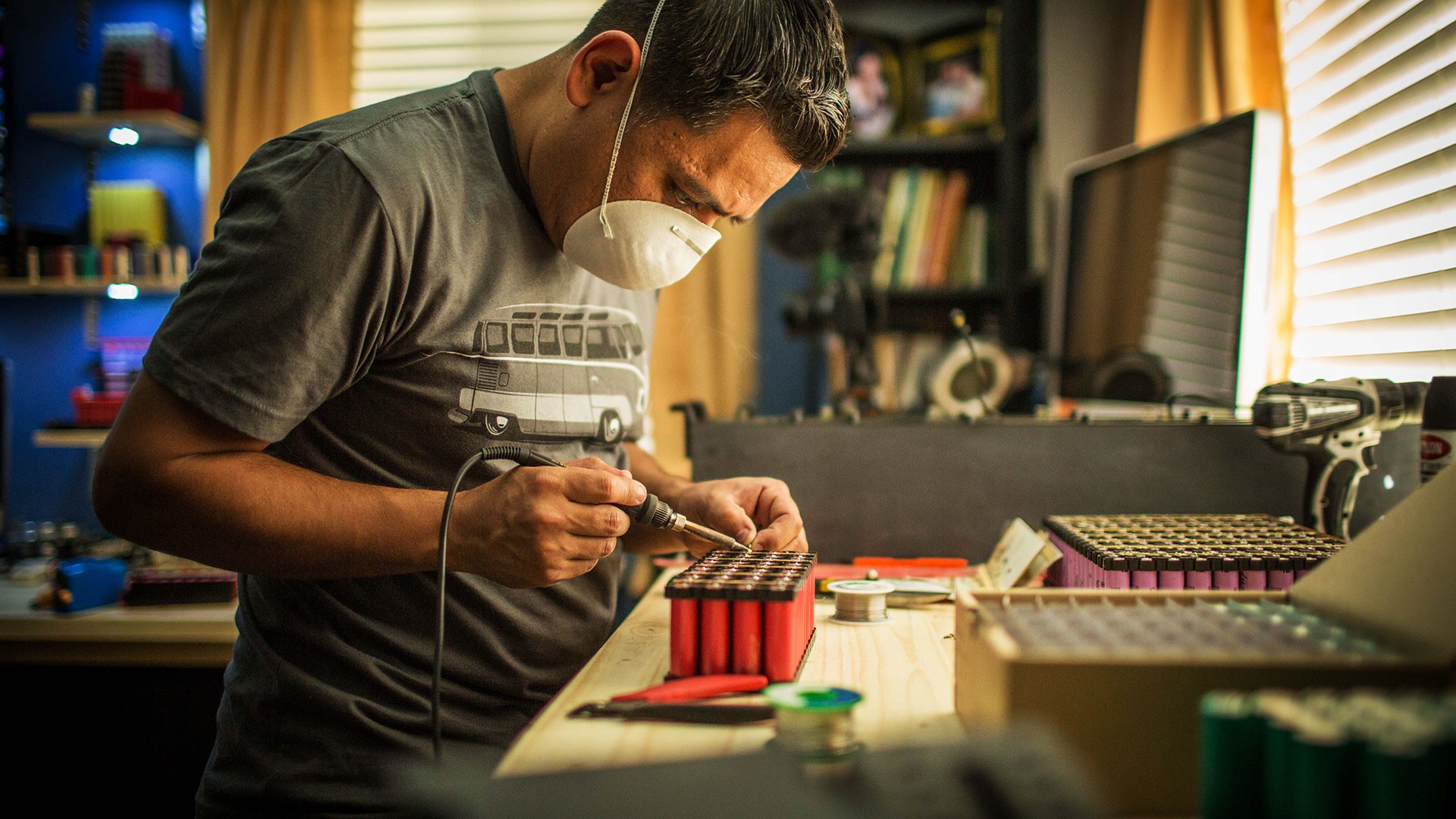Image: Che Saitta-Zelterman
You may have noticed we haven't published many stories this past week—it's been a busy year for us, and I wanted to give Motherboard's staff some time to recharge before what figures to be an even busier 2018. A few days before Christmas, I sent this note to our staff to take stock of the year we've had. We spend so much time heads down working on the site and our podcasts, documentaries, and other projects that we often forget to look at what we actually created.The work featured in this note was largely produced by Motherboard's current full-time staff and regular contributors; as always, we worked with dozens of fantastic freelancers, artists, producers, academics, as well as some people who have since moved on to other gigs. If you worked with us in any capacity this year, thank you so much for helping to make the site what it is. And THANK YOU if you read us, listened to our podcasts, watched our documentaries, came to an event, told your friends about us, or have otherwise found yourself on this blog post. We'll see you next year. -Jason Koebler, editor-in-chief*This year, we took a step toward cementing ourselves as the tech site that makes sure technology is working for people and that the future is being protected for all of humanity.Motherboard had some big scoops this year, and started or advanced several national conversations about Trump administration science censorship, Silicon Valley sexism (the Google Memo), Equifax’s gross negligence with the social security numbers of half of America, and broadband access/net neutrality. A Motherboard article was also the seed for this year's Science March.We published dozens of strong features, a standout video series called Dear Future, a longform documentary about smart guns, three podcasts called Science Solved It, PlusPlusPodcast, and Radio Motherboard, livestreamed someone hacking a router for four hours (and actually got people to watch it), and published the internet’s definitive Guide to Not Getting Hacked (also available as a PDF).In 2017, we found a giant, mysterious hole in Antarctica, talked to the farmers putting broadband antennas on their grain silos (and the farmers hacking their tractors), went inside Roscosmos, named-and-shamed Congress’s climate deniers, identified this rotted fucking whale, exposed “stalkerware” software that allows men to spy on their partners, submitted ourselves to months-long stress reduction experiments, met with Indian garment factory workers who are being automated out of jobs, visited America’s television graveyards, got James Damore fired, announced plans to build a community broadband network, interfaced with a series of time traveling iPhone users, and explained how data turned the world upside down, why you can never get tickets for your favorite concerts, why national parks are a hotbed of paranormal activity, and WTF a time crystal is. Dear Future is the among the most successful video projects Motherboard has done. They feel big, futuristic, and dangerous. The standout, produced by Lara Heintz, is about a community group in Detroit building its own internet infrastructure. It’s quick moving, subversive, and speaks to Motherboard’s mission to ensure technology is working for the people who use it. Other highlights: Xavier Aaronson went to Eastern Europe, sewage treatment plants, and the East River to learn about phages, the viruses that might save us from antibiotic resistant superbugs. We profiled a DIY movement that is using old laptop batteries to power their homes and cars. Yvette Bustamente was invaluable during pre- and post-production, and Erik Franco’s endless list of story ideas and contacts helped us pull this off.Shot over the course of a few years and produced by Brian Anderson and Lara Heintz, Who Killed the Smartgun? shows we can make thrilling, emotional, and politically enraging longform.
Dear Future is the among the most successful video projects Motherboard has done. They feel big, futuristic, and dangerous. The standout, produced by Lara Heintz, is about a community group in Detroit building its own internet infrastructure. It’s quick moving, subversive, and speaks to Motherboard’s mission to ensure technology is working for the people who use it. Other highlights: Xavier Aaronson went to Eastern Europe, sewage treatment plants, and the East River to learn about phages, the viruses that might save us from antibiotic resistant superbugs. We profiled a DIY movement that is using old laptop batteries to power their homes and cars. Yvette Bustamente was invaluable during pre- and post-production, and Erik Franco’s endless list of story ideas and contacts helped us pull this off.Shot over the course of a few years and produced by Brian Anderson and Lara Heintz, Who Killed the Smartgun? shows we can make thrilling, emotional, and politically enraging longform. Kate Lunau and Motherboard Canada went inside a dark matter laboratory that’s a mile underground and made some of the best 360/VR videos the format has seen with a six-part series about nuclear energy.Motherboard experimented with DIY explainer videos, doing a highly stressful iMac RAM upgrade and building an Ethereum mining rig.News editor Emanuel Maiberg keeps the site running on a day-to-day basis, but still managed to find time to go deep on the video game voice actors strike, lose his mind playing a game about paper clips, find inner peace reviewing the Xbox 4K, and warn readers to not let a robot suck your dick.Social editor Rachel Pick has one of the strongest voices on social media: She sells our often deep-in-the-weeds stories in an accessible way, finds the dankest memes, wrote a harrowing piece about getting an IUD in the age of Trump, and … kind of liked the Emoji movie?
Kate Lunau and Motherboard Canada went inside a dark matter laboratory that’s a mile underground and made some of the best 360/VR videos the format has seen with a six-part series about nuclear energy.Motherboard experimented with DIY explainer videos, doing a highly stressful iMac RAM upgrade and building an Ethereum mining rig.News editor Emanuel Maiberg keeps the site running on a day-to-day basis, but still managed to find time to go deep on the video game voice actors strike, lose his mind playing a game about paper clips, find inner peace reviewing the Xbox 4K, and warn readers to not let a robot suck your dick.Social editor Rachel Pick has one of the strongest voices on social media: She sells our often deep-in-the-weeds stories in an accessible way, finds the dankest memes, wrote a harrowing piece about getting an IUD in the age of Trump, and … kind of liked the Emoji movie? Kate Lunau is a force in Canada, regularly writing or pulling in stories about weird holes, strange whales, prospective nuclear waste sites, and shotgun-wielding guards who protect Arctic bases from polar bears. She oversaw the launch of Moveable, a transportation-focused subvertical, produced groundbreaking 360/VR video, and is one of our most trusted editors.Ankita Rao spearheaded On Edge, a cross-vertical theme week about millennial stress, undrained the swamp, tackled sexism in the city, and produces Radio Motherboard and PlusPlus podcasts.Kaleigh Rogers launched Broadband Land, an ongoing series about the digital divide, owns the net neutrality and broadband access beats, wrote about the long quest to find an antidepressant that actually works, and launched Science Solved It, a delightful podcast that will be back in 2018.New assistant editor Samantha Cole quickly owned the weird internet and future-of-porn beat, reporting on the terrifying ramifications of AI-generated face-swap porn, the difficulty adult creators have crowdfunding their work, documenting a Redditor’s quest back up 2 million gigabytes of porn, and analyzing the plot of Ted Cruz’s favorite porn scene.Researcher Erik Franco continued to be a jack-of-all trades, using his encyclopedic knowledge of Motherboard history and previously aborted projects to make Dear Future and something we're releasing in 2018 possible.
Kate Lunau is a force in Canada, regularly writing or pulling in stories about weird holes, strange whales, prospective nuclear waste sites, and shotgun-wielding guards who protect Arctic bases from polar bears. She oversaw the launch of Moveable, a transportation-focused subvertical, produced groundbreaking 360/VR video, and is one of our most trusted editors.Ankita Rao spearheaded On Edge, a cross-vertical theme week about millennial stress, undrained the swamp, tackled sexism in the city, and produces Radio Motherboard and PlusPlus podcasts.Kaleigh Rogers launched Broadband Land, an ongoing series about the digital divide, owns the net neutrality and broadband access beats, wrote about the long quest to find an antidepressant that actually works, and launched Science Solved It, a delightful podcast that will be back in 2018.New assistant editor Samantha Cole quickly owned the weird internet and future-of-porn beat, reporting on the terrifying ramifications of AI-generated face-swap porn, the difficulty adult creators have crowdfunding their work, documenting a Redditor’s quest back up 2 million gigabytes of porn, and analyzing the plot of Ted Cruz’s favorite porn scene.Researcher Erik Franco continued to be a jack-of-all trades, using his encyclopedic knowledge of Motherboard history and previously aborted projects to make Dear Future and something we're releasing in 2018 possible. Features Editor Brian Anderson is on the time traveling iPhone user beat, oversaw the launch of Kaleigh’s Broadband Land series, produced and hosted the smartgun doc, and conceived of and executed Outer Limits, a theme week about how technology and politics have affected how we relate to the outdoors and public lands.Lorenzo FB continues to be the world’s best cybersecurity reporter, getting scoop after scoop, put together the Guide to Not Getting Hacked, and published features about iPhone jailbreaking, Apple’s bug bounty program, Equifax’s horrible security, a political prisoner of a spyware deal gone wrong, and a “hacker” who was on the run from Mexico’s most dangerous cartel.Jordan Pearson, working closely with Motherboard Canada editor Kate Lunau and Daniel Oberhaus, has become the best cryptocurrency reporter in the field by staying away from the daily ups and downs of a volatile industry and instead focusing on the personalities, politics, and societal effects of decentralized money.New staff writer Daniel Oberhaus has written features on topics as diverse as surreptitious wifi hacking, fusion energy, a truly bizarre future town in Arizona, the science of bad acid trips, and America’s largest DIY rocketry event. He also built us an Etherum mining computer.Lara Heintz and Xavier Aaronson made this one of Motherboard’s most successful video years in recent memory. Xav oversaw the production of Most Unknown and Dear Future, and Lara continues to knock it out of the park with each documentary she does.Contributing editor Becky Ferreira continued to cover space, dinosaurs, and archaeology with an optimism and wonder rarely seen in online media, which made her the perfect person to spearhead Humans of the Year, a series of profiles about people who are fighting for the future of humanity.Contributing editor Sarah Emerson has become a masterful FOIA artist, using them to go after the Trump administration’s attack on the environment, tech companies’ bullying of local governments, and to expose people who burn their feet into Yellowstone’s hot springs, and learn more about Ryan Zinke’s favorite horse.Contributing editor Michael Byrne makes computer science, physics, quantum technology, and other deeply confusing Motherboard topics accessible. He also wrote a must-read personal essay about the physiology of panic attacks.Contributing editor Matthew Gault wrote about an alt-right children’s book and followed it to its logical conclusion, in which Pepe the frog’s creator sued much of the alt right. He also wrote the most harrowing essay you’ll ever read about orcs and conquered his video game completionist obsession.Terraform Editor Brian Merchant spent the first half of the year writing a book about the iPhone, but then returned and published outstanding works of speculative fiction (some quirky, some funny, and some and bleak), one of which was just optioned for a movie.
Features Editor Brian Anderson is on the time traveling iPhone user beat, oversaw the launch of Kaleigh’s Broadband Land series, produced and hosted the smartgun doc, and conceived of and executed Outer Limits, a theme week about how technology and politics have affected how we relate to the outdoors and public lands.Lorenzo FB continues to be the world’s best cybersecurity reporter, getting scoop after scoop, put together the Guide to Not Getting Hacked, and published features about iPhone jailbreaking, Apple’s bug bounty program, Equifax’s horrible security, a political prisoner of a spyware deal gone wrong, and a “hacker” who was on the run from Mexico’s most dangerous cartel.Jordan Pearson, working closely with Motherboard Canada editor Kate Lunau and Daniel Oberhaus, has become the best cryptocurrency reporter in the field by staying away from the daily ups and downs of a volatile industry and instead focusing on the personalities, politics, and societal effects of decentralized money.New staff writer Daniel Oberhaus has written features on topics as diverse as surreptitious wifi hacking, fusion energy, a truly bizarre future town in Arizona, the science of bad acid trips, and America’s largest DIY rocketry event. He also built us an Etherum mining computer.Lara Heintz and Xavier Aaronson made this one of Motherboard’s most successful video years in recent memory. Xav oversaw the production of Most Unknown and Dear Future, and Lara continues to knock it out of the park with each documentary she does.Contributing editor Becky Ferreira continued to cover space, dinosaurs, and archaeology with an optimism and wonder rarely seen in online media, which made her the perfect person to spearhead Humans of the Year, a series of profiles about people who are fighting for the future of humanity.Contributing editor Sarah Emerson has become a masterful FOIA artist, using them to go after the Trump administration’s attack on the environment, tech companies’ bullying of local governments, and to expose people who burn their feet into Yellowstone’s hot springs, and learn more about Ryan Zinke’s favorite horse.Contributing editor Michael Byrne makes computer science, physics, quantum technology, and other deeply confusing Motherboard topics accessible. He also wrote a must-read personal essay about the physiology of panic attacks.Contributing editor Matthew Gault wrote about an alt-right children’s book and followed it to its logical conclusion, in which Pepe the frog’s creator sued much of the alt right. He also wrote the most harrowing essay you’ll ever read about orcs and conquered his video game completionist obsession.Terraform Editor Brian Merchant spent the first half of the year writing a book about the iPhone, but then returned and published outstanding works of speculative fiction (some quirky, some funny, and some and bleak), one of which was just optioned for a movie.
Advertisement
Advertisement

Advertisement


Advertisement

Advertisement
